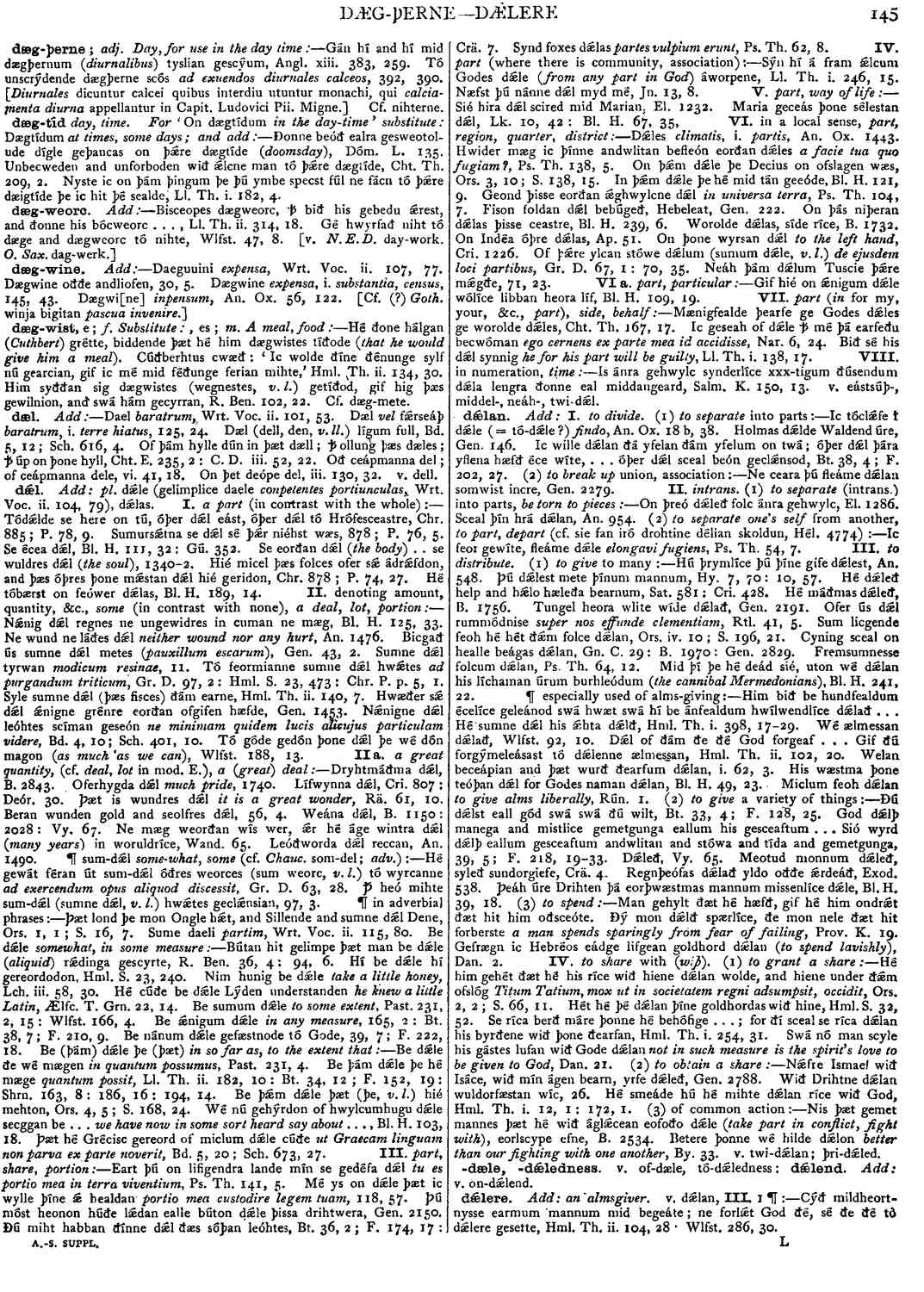dǽlan
- verb
-
Ic tóclǽfe ł dǽle ( = tó-dǽle ?)
findo,
- An. Ox. 18 b, 38.
-
Holmas dǽlde Waldend úre,
- Gen. 146.
-
Ic wille dǽlan ðá yfelan ðám yfelum on twá; óþer dǽl þára yflena hæfð éce wíte, . . . óþer dǽl sceal beón geclǽnsod,
- Bt. 38, 4; F. 202, 27.
-
Ne ceara þú fleáme dǽlan somwist incre,
- Gen. 2279.
-
On þreó dǽleð folc ánra gehwylc,
- El. 1286.
-
Sceal þín hrá dǽlan,
- An. 954.
-
Ic feor gewíte, fleáme dǽle
elongavi fugiens,
- Ps. Th. 54, 7.
-
Hú þrymlíce þú þíne gife dǽlest,
- An. 548.
-
Þú dǽlest mete þínum mannum,
- Hy. 7, 70: 10, 57.
-
Hé dǽleð help and hǽlo hæleða bearnum,
- Sat. 581; Cri. 428.
-
Hé máðmas dǽleð,
- B. 1756.
-
Tungel heora wlite wíde dǽlað,
- Gen. 2191.
-
Ofer ús dǽl rummódnise
super nos effunde clementiam,
- Rtl. 41, 5.
-
Sum licgende feoh hé hét ðǽm folce dǽlan,
- Ors. iv. 10; S. 196, 21.
-
Cyning sceal on healle beágas dǽlan,
- Gn. C. 29: B. 1970: Gen. 2829.
-
Fremsumnesse folcum dǽlan,
- Ps. Th. 64, 12.
-
Mid þí þe hé deád sié, uton wé dǽlan his líchaman úrum burhleódum (
the cannibal Mermedonians
),- Bl. H. 241, 22.
- ¶ especially used of alms-giving :-- Him bið be hundfealdum écelíce geleánod swá hwæt swá hí be ánfealdum hwílwendlíce dǽlað . . . Hé sumne dǽl his ǽhta dǽlð, Hml. Th. i. 398, 17-29.
-
Wé ælmessan dǽlað,
- Wlfst. 92, 10.
-
Dǽl of ðám ðe ðé God forgeaf . . . Gif ðú forgýmeleásast tó dǽlenne ælmessan,
- Hml. Th. ii. 102, 20.
- Welan beceápian and þæt wurð ðearfum dǽlan, i. 62, 3.
-
His wæstma þone teóþan dǽl for Godes naman dǽlan,
- Bl. H. 49, 23.
-
Miclum feoh dǽlan
to give alms liberally,
- Rún. 1.
-
Ðú dǽlst eall gód swá swá ðú wilt,
- Bt. 33, 4; F. 128, 25.
-
God dǽlþ manega and mistlice gemetgunga eallum his gesceaftum . . . Sió wyrd dǽlþ eallum gesceaftum andwlitan and stówa and tída and gemetgunga,
- 39, 5; F. 218, 19-33.
-
Dǽleð,
- Vy. 65.
-
Meotud monnum dǽleð, syleð sundorgiefe,
- Crä. 4.
-
Regnþeófas dǽlað yldo oððe ǽrdeáð,
- Exod. 538.
-
Þeáh úre Drihten þá eorþwæstmas mannum missenlíce dǽle,
- Bl. H. 39, 18.
-
Man gehylt ðæt hé hæfð, gif hé him ondrǽt ðæt hit him oðsceóte. Ðý mon dǽlð spærlíce, ðe mon nele ðæt hit forberste
a man spends sparingly from fear of failing,
- Prov. K. 19.
-
Gefrægn ic Hebréos eádge lifgean goldhord dǽlan (
to spend lavishly
),- Dan. 2.
-
Hé him gehét ðæt hé his ríce wið hiene dǽlan wolde, and hiene under ðǽm ofslóg
Titum Tatium, mox ut in societatem regni adsumpsit, occidit,
- Ors. 2, 2; S. 66, 11.
-
Hét hé þé dǽlan þíne goldhordas wið hine,
- Hml. S. 32, 52.
-
Se ríca berð máre þonne hé behófige . . .; for ðí sceal se ríca dǽlan his byrðene wið þone ðearfan,
- Hml. Th. i. 254, 31.
-
Swá nó man scyle his gástes lufan wið Gode dǽlan
not in such measure is the spirit's love to be given to God,
- Dan. 21.
-
Nǽfre Ismael wið Isáce, wið mín ágen bearn, yrfe dǽleð,
- Gen. 2788.
- Wið Drihtne dǽlan wuldorfæstan wíc, 26.
-
Hé smeáde hú hé mihte dǽlan ríce wið God,
- Hml. Th. i. 12, 1: 172, 1.
-
Nis þæt gemet mannes þæt hé wið áglǽcean eofoðo dǽle (
take part in conflict, fight with
), eorlscype efne,- B. 2534.
-
Betere þonne wé hilde dǽlon
better than our fighting with one another,
- By. 33.
Bosworth, Joseph. “dǽlan.” In An Anglo-Saxon Dictionary Online, edited by Thomas Northcote Toller, Christ Sean, and Ondřej Tichy. Prague: Faculty of Arts, Charles University, 2014. https://bosworthtoller.com/42567.
Checked: 0